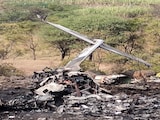Pakistan on Thursday banned the far-right Islamist party Tehreek-e-Labbaik Pakistan (TLP) under anti-terrorism laws, following deadly clashes during anti-Israel protests near Lahore that left at least five people dead.
The decision, announced after a cabinet meeting chaired by Prime Minister Shehbaz Sharif, marks the second time authorities have outlawed the group, which has led some of the country's most violent protests in recent years.
"The Federal Cabinet unanimously concluded that TLP is involved in terrorism and violent activities," the prime minister's office said in a statement.
It noted that the group's "violent protests, rallies, and demonstrations" have resulted in the deaths of security personnel and innocent bystanders.
The latest unrest began on October 9, when TLP supporters, led by party chief Saad Rizvi, marched from the eastern Punjab city of Lahore toward the capital Islamabad to protest a US-brokered ceasefire between Israel and Hamas.
At least five people, including a police officer, were killed when clashes erupted in Muridke, a town between Lahore and Islamabad, four days later.
Authorities have since launched a sweeping crackdown, sealing 95 bank accounts and several properties allegedly linked to the group.
Rizvi himself has gone underground to avoid arrest, Punjab government spokeswoman Azma Bokhari said.
Thousands Of Zealous Supporters
The group was previously outlawed in April 2021 after violent anti-France protests killed several police officers and civilians, but the ban was lifted seven months later.
The TLP contested the last two general elections, held in 2018 and 2024.
Although the party did not win any seats in parliament, it garnered over two million votes in each election.
In the February 2024 election, the TLP managed to win one provincial seat in Punjab.
The TLP has mobilised thousands of zealous supporters in recent years to paralyse cities, demand the expulsion of Western ambassadors, target religious minorities and incite riots.
The party, also known as the Movement at the Service of the Prophet, rose to prominence in 2016, protesting the execution of Mumtaz Qadri. The bodyguard assassinated Punjab governor Salman Taseer in 2011 over his calls to reform Pakistan's blasphemy laws, which still carry the death penalty.
Many Pakistanis saw Qadri as a hero -- a sentiment that gave TLP founder Khadim Hussain Rizvi, Saad's father, an opening to turn the group into a mass movement, analysts previously told AFP.
The TLP has its ideological roots in Barelvi Islam, a mainstream sect generally seen as moderate, but for whom blasphemy is a red line.
(Except for the headline, this story has not been edited by NDTV staff and is published from a syndicated feed.)















